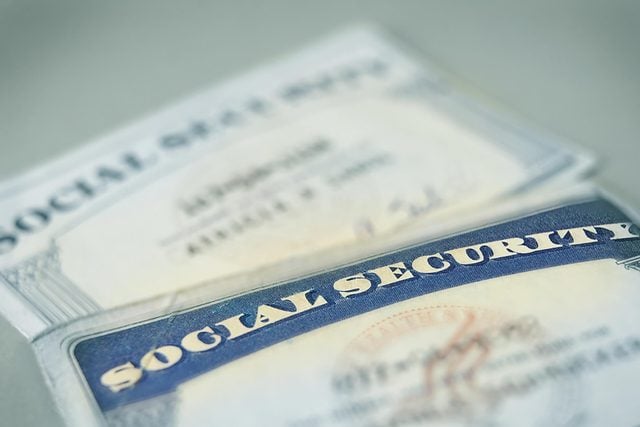5 Times You Should Never, Ever Give Out Your Social Security Number
Updated: Feb. 07, 2023
Giving out personal information like your Social Security Number makes you vulnerable to security breaches—but the good news is that you don't always have to share.
 To avoid becoming a victim of identity theft, it’s important to take steps to safeguard your personal information. Following credit rating company Equifax’s announcement in September, 2017, that its databases had been hacked, exposing the personal information of an estimated 143 million people (including around half of the U.S. population), you might be wondering if you can do more to protect yourself.
To avoid becoming a victim of identity theft, it’s important to take steps to safeguard your personal information. Following credit rating company Equifax’s announcement in September, 2017, that its databases had been hacked, exposing the personal information of an estimated 143 million people (including around half of the U.S. population), you might be wondering if you can do more to protect yourself.
“Security based on information that is difficult or impossible to change makes people more vulnerable, which is why breaches like Equifax are so problematic,” says Drew Paik of security firm Authentic8. “Breaches like those divulge massive amounts of data that cannot be changed. You can’t change your birthday, a former address, or the high school you attended, although many wish they could. It’s the same reason why security based on biometrics is not the best option: You can’t change your fingerprints.”
While you can’t withhold your name or date of birth from applications and purchases requiring personal information, one thing you can withhold is your Social Security number (SSN). Originally created to track income to determine Social Security benefits in retirement, it has become a near-universal form of identification and is often requested whenever you provide personal information.
However, on many occasions, it’s not actually necessary to share your SSN, and the Social Security Administration warns that you should be careful about doing so—even when you’re specifically asked for it. “First, focus on where you have to give your SSN,” advises Ryan Satterfield of Planet Zuta Data Security. “Taxes and insurance are the only things that require SSNs. Then list everywhere you don’t have to give an SSN.”
Here are five times you shouldn’t ever give out your Social Security number—even if you’re asked for it.
At the doctor’s office
Patient forms from your doctor may request your SSN, but it’s not necessary to provide it. It is your insurance policy number your insurance company needs in order to bill you and submit payments. The IRS says you need to give your doctor your SSN if you have Medicare or other federally sponsored health care, but in all other cases, you don’t.
Booking travel
While you need to provide your credit card details (and possibly your passport number, depending on your destination), you don’t need to give your SSN when purchasing plane tickets and making other travel reservations. You don’t need your SSN to travel either—your passport, driver’s license, or other TSA-approved forms of ID are sufficient.
Attending school or college
All children living in the U.S. have the right to attend public school, and no school can require a child or their parents to provide an SSN at enrollment. According to the U.S. Department of Justice, a birth certificate or passport is an acceptable proof of identity. College students don’t need to provide their SSN either, although they will need to submit it if they apply for financial aid, loans, or scholarships.
During a job interview
You don’t have to give a prospective employer your SSN, confirms the Society of Human Resource Management, but after you’ve been hired you will need to provide it for a background check. (Here’s how to answer tricky job interview questions.)
At the grocery store
Your grocery store might ask for your SSN when you’re applying for a reward card, but you can leave this box blank. While you need to provide your SSN when applying for a credit card (to let the bank check your credit score), retailers’ reward cards don’t have any credit value.
Unfortunately, business processes are often designed in a way that they can’t move forward without an SSN, says Robert, Wood, Director of Trust at healthcare company Nuna. “If somebody opts out then it’s likely in many circumstances that they will miss out on that service,” he reveals. In the light of yet another massive security breach, surely it’s time for businesses to rethink the kind of personal information they truly need to function and to focus on getting things done with the absolute minimum requirements?
If you’re asked for your SSN and you’re not sure if you should provide it, the Social Security Administration recommends asking why your number is needed, how it will be used, and what will happen if you refuse.
And if you do have to provide your SSN, be wary of giving it digitally, warns Avi Chesla, CEO of empow. “The person on the other end of the email might be vulnerable to attacks (like malware) that can automatically steal personal data and then be used by a third party for malicious intent,” he warns. “Banks, for example, are supposed to be better protected against these types of malware than other organizations. But even if you trust them, you are still better off passing along your SSN in person to a representative, rather than digitally. Similar malware was used in this year’s Verizon breach, and have since become even more advanced—so be careful!”
Follow these steps to avoid identity theft if your wallet is lost or stolen.